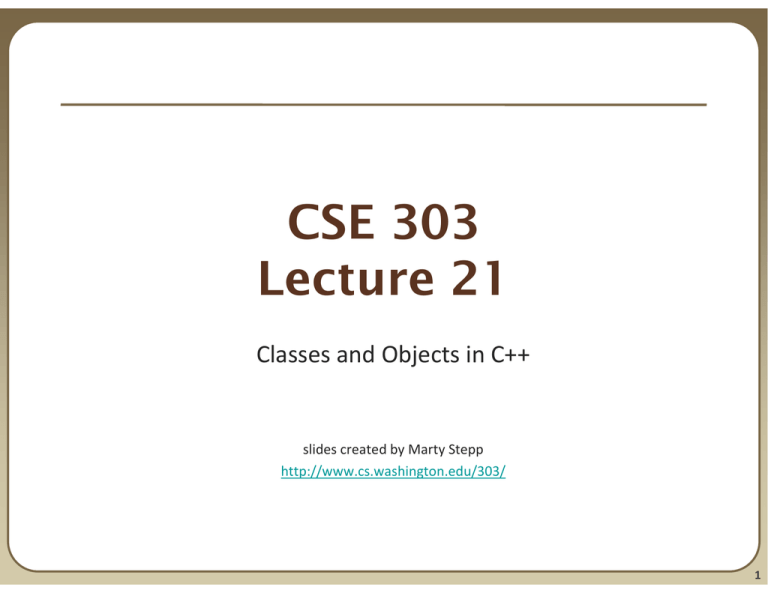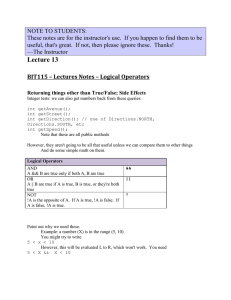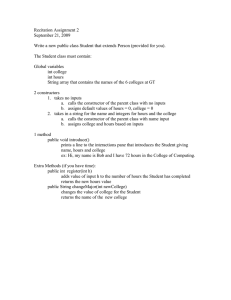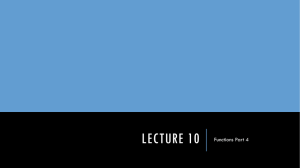CSE 303 Lecture 21
advertisement

CSE 303
Lecture 21
Classes and Objects in C++
slides created by Marty Stepp
http://www.cs.washington.edu/303/
1
C++ classes
• class declaration syntax (in .h file):
class name {
private:
members;
public:
members;
};
• class member definition syntax (in .cpp file):
returntype classname::methodname(parameters) {
statements;
}
unlike in Java, any .cpp or .h file can declare or define any class
(though the convention is still to put the Foo class in Foo.h/cpp)
2
A class's .h file
#ifndef _POINT_H
#define _POINT_H
class Point {
private:
int x;
int y;
.h file still uses #ifndef to guard
against multiple inclusion
(many compilers also support
an alterative called #pragma once)
// fields
public:
Point(int x, int y);
private/public members
are grouped into sections
// constructor
int getX();
// methods
int getY();
double distance(Point& p);
void setLocation(int x, int y);
};
MUST have a semicolon at end of class, or:
#endif
Point.cpp:4: error: new types may not be defined in a return type
Point.cpp:4: error: return type specification for constructor invalid
3
A class's .cpp file
#include "Point.h"
// this is Point.cpp
Point::Point(int x, int y) {
// constructor
this->x = x;
each member is defined on its own,
this->y = y;
using :: scope operator to indicate class name
}
int Point::getX() {
return x;
}
int Point::getY() {
return y;
}
this is an unmodifiable pointer to the
current object (of type const Point* )
works a lot like Java's this, but cannot be
used to invoke a constructor
void Point::setLocation(int x, int y) {
this->x = x;
using this-> is optional unless names conflict
this->y = y;
}
4
Exercise
• Make it so a Point can be constructed with no x/y parameter.
If no x or y value is passed, the point is constructed at (0, 0).
• Write a translate method that shifts the position of a point by a
given dx and dy.
5
Exercise solution
// Point.h
public:
Point(int x = 0, int y = 0);
// Point.cpp
void Point::translate(int dx, int dy) {
setLocation(x + dx, y + dy);
}
6
More about constructors
• initialization list: alternate syntax for storing parameters to fields
supposedly slightly faster for the compiler
class::class(params) : field(param), ..., field(param) {
statements;
}
Point::Point(int x, int y) : x(x), y(y)
{}
• if you don't write a constructor, you get a default () constructor
initializes all members to 0-equivalents (0.0, null, false, etc.)
• if your class has multiple constructors:
it doesn't work to have one constructor call another
but you can create a common init function and have both call it
7
Constructing objects
• client code creating stack-allocated object:
type name(parameters);
Point p1(4, -2);
x
stack
y
0x086D0008 p1
4 -2 methods
0x086D0004 p2
0xFD30F0
available
• creating heap allocated (pointer to) object:
type* name = new type(parameters);
Point* p2 = new Point(5, 17);
0x00FD30F0
in Java, all objects are allocated on the heap
in Java, all variables of object types
are references (pointers)
heap
x
y
5
17
methods
global data
code
8
A client program
// use_point.cpp
// g++ -g -Wall -o use_point Point.cpp use_point.cpp
#include <iostream>
#include "Point.h"
using namespace std;
int main() {
Point p1(1, 2);
Point p2(4, 6);
cout << "p1 is: (" << p1.getX() << ", "
<< p1.getY() << ")" << endl;
cout << "p2 is: (" << p2.getX() << ", "
<< p2.getY() << ")" << endl;
cout << "dist : " << p1.distance(p2) <<
return 0;
}
// p1 is: (1, 2)
// p2 is: (4, 6)
endl;
// dist : 5
9
Client with pointers
// use_point.cpp
// g++ -g -Wall -o use_point Point.cpp use_point.cpp
#include <iostream>
#include "Point.h"
using namespace std;
int main() {
Point* p1 = new Point(1, 2);
Point* p2 = new Point(4, 6);
cout << "p1 is: (" << p1->getX() << ", "
<< p1->getY() << ")" << endl;
// p1 is: (1, 2)
cout << "p2 is: (" << p2->getX() << ", "
<< p2->getY() << ")" << endl;
// p2 is: (4, 6)
cout << "dist : " << p1->distance(*p2) << endl;
delete p1;
// dist : 5
delete p2;
// free
return 0;
}
10
Stack vs. heap objects
• which is better, stack or pointers?
if it needs to live beyond function call (e.g. returning), use a pointer
if allocating a whole bunch of objects, use pointers
• "primitive semantics" can be used on objects
stack objects behave use primitive value semantics (like ints)
• new and delete replace malloc and free
new does all of the following:
• allocates memory for a new object
• calls the class's constructor, using the new object as this
• returns a pointer to the new object
must call delete on any object you create with new, else it leaks
11
Implicit copying
Why doesn't this code change p1?
int main() {
Point p1(1, 2);
cout << p1.getX() << "," << p1.getY() << endl;
example(p1);
cout << p1.getX() << "," << p1.getY() << endl;
return 0;
}
void example(Point p) {
p.setLocation(40, 75);
cout << "ex:" << p.getX() << "," << p.getY() << endl;
}
// 1,2
// ex:40,75
// 1,2
12
Object copying
• a stack-allocated object is copied whenever you:
pass it as a parameter
return it
assign one object to another
foo(p1);
return p;
p1 = p2;
• the above rules do not apply to pointers
object's state is still (shallowly) copied if you dereference/assign
*ptr1 = *ptr2;
• You can control how objects are copied
by redefining the = operator for your class (ugh)
13
Objects as parameters
• We generally don't pass objects as parameters like this:
double Point::distance(Point p) {
int dx = x - p.getX();
int dy = y - p.getY();
return sqrt(dx * dx + dy * dy);
}
on every call, the entire parameter object p will be copied
this is slow and wastes time/memory
it also would prevent us from writing a method that modifies p
14
References to objects
• Instead, we pass a reference or pointer to the object:
double Point::distance(Point& p) {
int dx = x - p.getX();
int dy = y - p.getY();
return sqrt(dx * dx + dy * dy);
}
now the parameter object p will be shared, not copied
are there any potential problems with this code?
15
const object references
• If the method will not modify its parameter, make it const:
double Point::distance(const Point& p) {
int dx = x - p.getX();
int dy = y - p.getY();
return sqrt(dx * dx + dy * dy);
}
the distance method is promising not to modify p
• if it does, a compiler error occurs
• clients can pass Points without fear that their state will be changed
which of these lines would be legal inside distance?
Point p2 = p;
Point& p3 = p;
16
const methods
• If the method will not modify the object itself, make it const:
double Point::distance(const Point& p) const {
int dx = x - p.getX();
int dy = y - p.getY();
return sqrt(dx * dx + dy * dy);
}
a const after the parameter list signifies that the method will not
modify the object upon which it is called (this)
• helps clients know which methods are / aren't mutators
• helps compiler optimize method calls
a const reference only allows const methods to be called on it
• we could call distance on p, but not setLocation
17
const and pointers
• const Point* p
p points to a Point that is const; cannot modify that Point's state
can reassign p to point to a different Point (as long as it is const)
• Point* const p
p is a constant pointer; cannot reassign p to point to a different object
can change the Point object's state by calling methods on it
• const Point* const p
p points to a Point that is const; cannot modify that Point's state
p is a constant pointer; cannot reassign p to point to a different object
(This is not one of the more beloved features of C++.)
18
Pointer, reference, etc.?
• How do you decide whether to pass a pointer, reference, or object?
• Some design principles:
Minimize the use of object pointers as parameters.
(C++ introduced references for a reason. They are safer and saner.)
Minimize passing objects by value, because it is slow, it has to copy the
entire object and put it onto the stack, etc.
In other words, pass objects as references as much as possible.
• Though if you really want a copy, pass it as a normal object.
Objects as fields are usually pointers (why not references?).
If you are not going to modify an object, declare it as const.
If your method returns a pointer/object field that you don't want the
client to modify, declare its return type as const.
19






